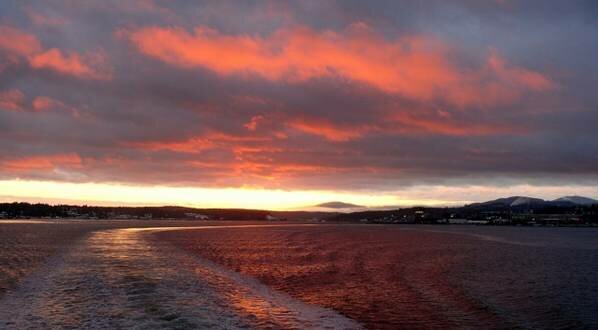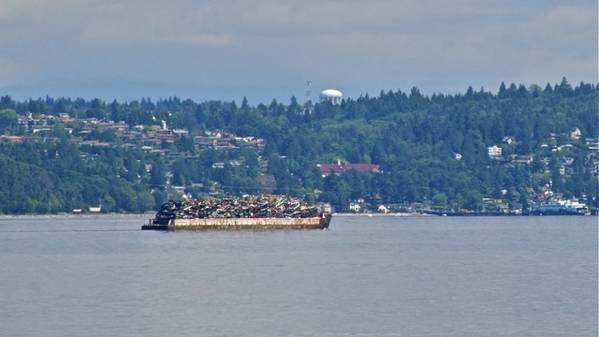It's not every day that we get a news release datelined "Toppenish, WA" so you're going to hear about it.*
Very quickly in the story, though, we leave Toppenish for more exotic climes, as NOAA has tasked a high-altitude, twin-engine Gulfstream IV-SP jet to patrol the North Pacific Ocean this winter, and watch for winter storms developing there that will hit the continent (i.e., us) later on.
From now until February, the plane will be stationed at Yokota Air Force Base in Japan, then in March move to Honolulu. While aloft, it will "collect information such as wind speed and direction, pressure, temperature and humidity," which, fed by satellite to forecasting centers, should help modeling software develop more precise outcomes.
U.S. Senator Maria Cantwell, who is chair of the Oceans, Atmosphere, Fisheries, and Coast Guard Subcommittee, draws your attention to the benefit to Washington state:
Especially during this wet La Niña winter season, more accurate data on storms gathering off our coast is critical to our safety and livelihoods. Washington state is at the frontline of dangerous storms, and this plane’s high-tech capabilities will provide important supplemental data about any dangers approaching us. This winter season, residents, businesses and property are better protected with the help of this plane, which significantly improves forecasting of winter storms....
(more)
The New York Times seems delighted to dispel any remaining myths about the untouched natural beauty of Washington state. Just this week readers have learned that there's three times the amount of plutonium waste at Hanford as "thought," and that the Puget Sound's pH level is declining in part due to ocean acidification and the water is growing more corrosive. (Thanks. We'll be expecting a make-up "36 Hours in Seattle," soon.)
The Seattle Times goes straight to the pH-decline bottom line: the impact on the Puget Sound shellfish industry.
The Taylor Shellfish hatchery on Hood Canal's Dabob Bay had its first good year in several in 2009, but company spokesman Bill Dewey said he suspects that's merely because the winds cooperated, preventing acidified seawater from entering the relatively stable bay.
The company recently installed sophisticated pH monitors at its hatchery to determine when it's best to draw water off the surface, from way down deep—or not at all.
In an earlier story, from January this year, the Seattle Times looked at the cause-and-effects of ocean acidification in general. The world's oceans act as a carbon dioxide sink, claiming excess CO2 from the atmosphere, but CO2 dissolved in water creates a weak acid solution. It turns out that shellfish larvae, for one, are very sensitive to changes in pH.
The new study on the Puget Sound's ocean-acidification intake represents the work of researchers with NOAA, the University of Washington, and the state's Department of Ecology. (It's published in the latest issue of Estuarine, Coastal and Shelf Science.) The researchers make it clear that the Sound is struggling mightily with the human activity around it--the toxic pollution and "nutrient-rich" flows that are channeled into it, both killing off life and promoting algae blooms that...also kill off life....
I had thought the fussin' and feudin' over NOAA's home port move from Seattle to Newport, OR, was over when NOAA decided they were right the first time. But Senator Maria Cantwell doesn't take NOAA for an answer.
*steely gaze at readers*
Cantwell told Commerce Secretary and former Washington governor Gary Locke that NOAA's Newport home port would be a waste of taxpayer dollars, and blatantly disregards an Inspector General's finding that there are "cheaper, government-owned alternatives."
Locke argued that the IG findings said the "defects" in NOAA's siting process weren't sufficient to overturn their decision, and Cantwell came down on him like a ton of bricks: "I don’t think the Inspector General has given you a blanket go-ahead authority. If you have such a document, I’d love to see it."
The lesson here is that you do not mess with Maria Cantwell just after she's been stood up by President Obama (her presentation on the CLEAR Act this morning was canceled) over some Rolling Stone kerfluffle.
In a news release, Cantwell said the next step would be for Congress to consider halting funding of the construction. BAM!
Here's the full text of their cage match after the jump:...
 This photo has nothing to do with Sand Point.
This photo has nothing to do with Sand Point.
This just in over the e-wire: "In a letter sent today to U.S. Commerce Secretary Gary Locke and Under Secretary Jane Lubchenco, Mayor Mike McGinn and the Seattle City Council argued that consolidating NOAA’s operations in Seattle at existing federal facilities is the best option for NOAA to achieve its mission and the best deal for federal taxpayers."
(Note to the Mayor: My mother would prefer you went by Michael, at least on official documents.)
The Seattle sites up for NOAA grabs are the Western Regional Center at Sand Point and Federal Center South, both conspicuously not located in a floodplain. (Due to pressure from, well, everyone outside of Newport, OR, but specifically a protest from the Port of Bellingham, NOAA has had to go back and prove the necessity of leaving Seattle to build in Newport, which is in floodplain territory.)
There are real heavyweights involved here--NOAA provides employment for 1,200 people, directly and indirectly, and is said to pump about $180 million in economic activity into the area. That's why we're presented with the unusual sight of the International Association of Machinist Local 160 linking arms with the Laurelhurst Community Club.
NOAA's reassessment should finish up by the end of May 2010.


Most Recent Comments